Talena Winters's Blog
November 27, 2025
Defying Gravity: The Songwriting Dream I’m Finally Chasing in 2026
With the release of Wicked: For Good last weekend, my hubby, two at-home sons, and I rewatched Part 1 on Friday, then all but one of us (who opted to wait for streaming) went to the theatre to watch Part 2.
And with that, I’ve finally seen the whole show. A show I’ve claimed as one of my favourite musicals for nearly twenty years.
It did not disappoint.
I’ve already waxed at length about Wicked’s charms (including a comparison to Batman!), so I’ll let you read that post if you want more (with the one addition that these movies were some of the most beautiful I’ve ever seen—right up there with the 2002 film Hero). This post isn’t about that.
This post is about music. Specifically, how finally experiencing this story in its full glory affirmed a decision to take a leap toward a goal that has long seemed out of reach, pie-in-the-sky.
But, as Glinda the Good does when telling her and Elphaba’s story, I need to go back to the beginning.
Actually, I already did that too. But this time, I’m telling parts of the story I previously left out.
 The Birth of a Dream
The Birth of a DreamFrom the time I was four years old, I was doing two things: reading books like my life depended on it, and making music.
Having been a music teacher for twenty years, I now know how rare it is that a four-year-old has the desire, discipline, and even the ability to read well enough to begin piano lessons at that age. While I did occasionally need some gentle encouragement to remember to practice, for the most part, I wanted to do it. And when my family had to give up my lessons when I was fourteen for financial reasons, I continued learning and advancing on my own.
Music was in my soul.
I was naturally talented as a musician—my mom told me I started singing before I started talking. But it still didn’t come “easy” to me, or so it felt.
When I was nine, my age-mate and second cousin Clay Hilman started taking lessons with my same teacher, and within a year, he was playing circles around me. (Clay is an incredibly talented and creative artist in multiple mediums to this day. I highly recommend you check out his albums—he has a wonderful Christmas one called “Little Blue Houses” that I can’t find online anywhere, unfortunately. But his other albums are also among my faves.)
At any rate, something about that experience implanted a deep doubt in my own ability as a musician.
When I later saw both the movie and stage play of Amadeus, the fictionalized story of how competing composer Antonio Salieri purportedly spent his life quietly manipulating Mozart to an early death due to professional jealousy, I deeply empathized with his feelings of inadequacy in the face of genius.
Not that I felt jealous of anyone. (Not even Clay—I got over that at around age eleven.) I just feared I was doomed to a life compelled to create beautiful and epic art only to be overshadowed by those more talented and capable than I.
“It’s not that I wanted fame and glory. I just wanted to make a living making music, and for my work to bless others the way the work of others had so often blessed and inspired me.”
I didn’t want fame and glory. I just wanted to make a living making music, and for my work to bless others the way the work of others had so often blessed and inspired me.
My voice, while passable and with good pitch, isn’t the stuff of pop legends (which was made clear to me by a well-meaning teacher in middle school—the truth often hurts, but I had a deep embarrassment about my singing voice in any context for years after that). But I’d started composing around the age of nine, and as soon as I heard there were people who made careers out of writing songs for other performers, I knew that was what I wanted to do.
So when I later made an almost last-minute decision to go to college, I chose a music diploma program, and the doors opened in miraculous ways for me to attend. Those two years were a turning point that changed the shape of my life and launched me down the path of being the career creative I am today.
More than a WishI knew, in my bones, that I’d been called to create music for a living.
So for the next fifteen years, around raising kids and moving all over the continent and working side-hustle businesses to help pay some bills and slowly fund my music career, I kept working.
I wrote songs—a lot of songs. My co-writer and college bestie and I finished the full-scale musical we’d begun in our second year. I forked out thousands of hard-earned dollars to get professional demos made of several of my best songs. I found a songplugger (the old-school way songwriters would get their songs to publishers and labels, like an agent for songwriters). I submitted to contests. I took songwriting courses and read craft books and kept growing my skills. I studied the music business and went to a music conference and made connections online. I paid for critiques of my songs. I slowly started buying the equipment and learning the skills I’d need to produce demos myself—or at least, half-decent scratch recordings.
And I saw some successes—two of my songs won awards. The songplugger seemed to think my music had potential. A couple of indie artists cut tracks of mine. Several indie record companies weren’t interested in the demo songs I’d sent them, but wanted to hear more demos (which I didn’t have). And when Candace and I presented a walk-through of our musical to some prominent contacts in Alberta’s theatre community, they also thought it had potential, if we kept working on it. (Circumstances shut that down at the time, and the project is currently in limbo.)
But during the fifteen years that all of this transpired, the music industry was undergoing a seismic shift. Streaming and YouTube took over, album sales dropped, and songpluggers were replaced by viral YouTube hits being noticed by producers. While I was excited by the potential of reaching people online, I was too busy with child-rearing and running our household on basically a single income barely supplemented by my part-time businesses (a choice my hubby and I made to prioritize our time together and with our children) to do much but study some of the musicians pioneering these new business models (such as YouTube a capella cover artist Peter Hollens and dancing violin sensation Lindsey Stirling).
But even though YouTube meant you could be a career musician without having to tour (something I never wanted), I still didn’t have the chops to be a singer-songwriter. I wanted to write for other artists.
“Despite all I’d done to move my craft forward, when it came to getting artists interested in my music, I had two obstacles: money and time. Mostly money.”
And, despite all I’d done to move my craft forward, when it came to getting artists interested in my music, I had two obstacles: money and time. Mostly money.
Remember how I said I’d had some pro demos made? Twenty-three years ago, “Walking in the Sonlight” and “The Nails (I Did This For You)” cost over a thousand dollars each. For songwriter’s demos—speculative projects to be tossed out into the void, not tracks for released that were expected to make money. (I did eventually release them, as demos, in the hopes of gaining more attention from industry folks—a spaghetti-on-the-wall experiment that didn’t pan out.)
Ten years later, “Let Me Love” set me back even more. And, by then, I’d discovered that no one really wanted to pay for music tracks anymore—not even $0.99. Napster (remember Napster?) and Spotify had trained audiences that they should expect music to be free or an all-you-can-download monthly subscription buffet.
A Dream InterruptedTo succeed in the music business, the common wisdom was to create demos of all your best songs (by 2012, I had at least two dozen in various genres I knew had potential—you do the production cost math) and pitch them over and over again.
To whom? Well, this was before Instagram, Facebook was barely past its startup you-and-your-high-school-friends phase, and YouTube was where scrappy indies pioneering new models covering popular songs or their own originals went, not professional artists looking to contract someone else’s music. (And I kind of missed the MySpace craze—I had an account, but never really got into it.)
To find the right industry people to pitch songs to, you needed to pay for an expensive directory or a subscription to one (which is somewhat still the case). Thank goodness you no longer needed to fork out postage to send demo CDs to these people, but that didn’t change the fact that someone truly wanting to gain traction in the music business needed to invest a lot of time and money (not either-or) to try to hit an ever-diminishing potential return on their investment, or be willing to start a YouTube business—though no one called it that at the time—as a performing musician.
So in 2015, when I published my first novella—a project that had taken me a couple of months and a few hundred dollars to produce basically on my own (with some hired freelancers for editing and cover design) without the hassle of depending on the career aspirations and schedules of others to “pick” me, and people were actually willing and eager to pay to read the finished result—I had to do some soul-searching.
After losing my son that year, I suddenly had space in my life (against my will, but there I was) to turn my attention back to my own career aspirations for the first time in over a decade. And, with much sorrow, I came to the conclusion that with the state of the music industry and my resources, it made more sense to pursue publishing than songwriting. It felt like hacking off part of my soul.
“After nearly two decades of actively pursuing my music career dreams, I’d been defeated not by my inadequacy as a songwriter but by the inadequacy of my resources in the face of an industry that had a high financial and time bar to entry.”
After nearly two decades of actively pursuing my music career dreams, I’d been defeated not by my inadequacy as a songwriter but by the inadequacy of my resources in the face of an industry that had a high financial and time bar to entry.
Ten years later, here I am, with a career as a novelist that is finally starting to see returns.
If I’d known it would take this much time and effort (and money, because this is an expensive industry, too) to get this far, would I have chosen to pursue publishing instead of just devoting that effort to a career as a musician?
Honestly, I don’t know. I don’t regret the choice I made, though. And, after returning to songwriting earlier this year, I realized I’m actually a far better songwriter now than when I stepped back ten years ago, thanks to my continued work in honing my storytelling and writing crafts.
So, as I so often say, “no skills gained are ever wasted.”
New Winds in my SailsThanks to AI, the music and publishing industries are both undergoing another seismic shift, along with every other creative (and non-creative) industry. And while that shift has some downsides, as these things always do, it’s also had a lot of upsides in lowering the bar to entry. (Actually, this is also contributing to the downside of an increased difficulty being visible in the noise, but that’s not a new problem.)
For me as a fiction writer, I don’t begrudge new writers using AI tools to finally realize their dreams. I know that AI used ethically isn’t a get-rich-quick scheme, but still a lot of work to learn the craft and business of publishing—and even for scammers using it unethically, I think of Proverbs 13:11: “Dishonest money dwindles away, but whoever gathers money little by little makes it grow.”
For me as a songwriter, AI has finally removed one of the biggest barriers to entry of creating music—the high cost of demo production.
After trying AI music tool Suno for the first time in April, I immediately got excited about music again, in a way I hadn’t anticipated. I hadn’t realized what a wound I still had in my soul about giving up on all the dreams I’d worked so hard for all those years, but creating music—both new songs and, for the first time, hearing some of my older songs with my ears the way I’d always heard them in my head—started to heal it.
A couple weeks ago, I wrote a song I knew had chart-topping potential, if it was performed by the right band. I’d written it for fun, on a bolt of inspiration from the most random source—a word mentioned on a tech podcast (moonshot) that became my hook.
And it made me stop and ask myself: What do I really want from my music?
To just make music for fun, forever, with AI-assisted productions that no one takes seriously and many automatically discount as “slop” without ever knowing how much craftsmanship and care and real humanity goes into each one—from writing and revising lyrics and melodies and chord structures, through production and post-production?
Or to do what I’d always wanted—to make money writing music?
As I typed that, my husband was listening to the final strains of “The Impossible Dream” performed by an epic pop diva in the other room, which is not his normal fare at all, and it feels like one more confirmation of what I decided last week:
I’m taking the leap and finally following my dream of professional songwriting.
“What do I really want from my music?The Not-So-Impossible Dream?
To just make music for fun, forever, with AI-assisted productions that no one takes seriously and many automatically discount as “slop” without ever knowing how much craftsmanship and care and real humanity goes into each one—from writing and revising lyrics and melodies and chord structures, through production and post-production? Or to do what I’d always wanted—to make money writing music?”
AI tools have empowered me to create demos of a production quality not even my pro demos previously achieved, and for only a few hours (well, quite a bit more than a few) of my time and a bit of money each. In fact, because of working with AI tools, I’m finally learning how to produce music well on my own. I’ve even been eying up some courses on music production. (I would love to learn to produce cinematic pop songs like Tommee Profitt.)
And some of the changes I missed in my decade away from the music industry have empowered freelance music professionals to take control of their own careers and make a living independent of music labels through online music service marketplaces.
That’s where I plan to start. To put out my shingle as a songwriter and lyric editor for hire. My goal is to be paid to write music by the end of 2026, even if it’s only one song, which seems perfectly achievable.
Am I giving up on publishing? Nope. I still have a lot of stories to tell, and I intend to keep telling them.
But when it comes to the dream that can bring me to tears I want it so bad? That’s songwriting.
And since I hope to inspire others to follow their dreams through the stories I tell, it’s high time I did that for myself.
It’s time to defy gravity and pursue my bone-deep calling.
Along with this shift in purpose, I’ve decided not to release any more of my demo tracks to streaming platforms, except for rare I-made-this-for-me-and-my-fans music. Instead, I’ll keep publishing them here on my website as part of my demo catalogue. However, any tracks I publish in my Listening Room blog will be public immediately. (No more “early access for premium Books and Tea League members” perk—they’ll still have plenty others.) Newsletter subscribers to my music content will be notified.
And if you’re a musician, or know one, who would be a good fit for any track I release, please let me know. (Watch for “Moonshot” to be put up as soon as I have time to finish production on it.)
I hope you’ll continue to come along with me on this journey.
Latest Track: “Ancient of Days”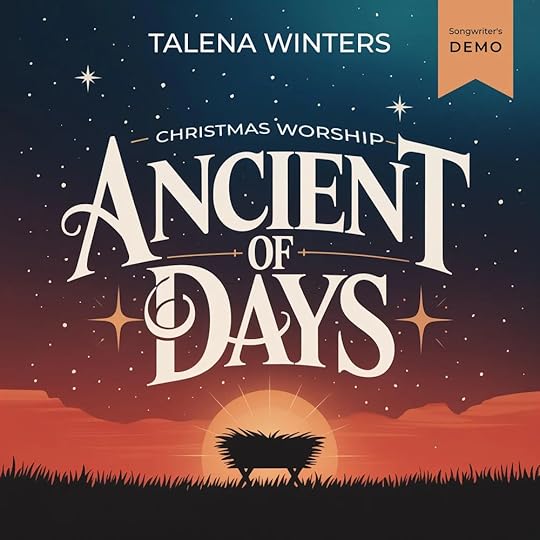
Earlier this week, I put up a Christmas song demo with two versions to enjoy. About the song:
Songwriter’s Demo: “Ancient of Days” is a Christmas worship song about the wonder of the all-powerful Creator choosing to come as a fragile, vulnerable infant. Driven by a Latin-inspired groove, the song works in both pop and rock styles. A show-stopper for Christmas services, concerts, or special features.
Listen NowNovember 13, 2025
The Character Who Wrecked Me (And Why That’s Weirdly Healthy)

Courtesy of Teslariu Mihai on Unsplash.
I finished a season of a show I love the other night. No spoilers, I promise. A favourite character died, and my brain promptly scheduled a multi-day vigil. I went about my life—emails, writing, actual humans who needed things—but, beneath it all, I was not okay.
If that sounds dramatic, it isn’t. It’s human. And it’s old.
Why stories hurt so goodAristotle, who had Opinions about basically everything, argued that tragedy gives us catharsis—a purifying release. We feel pity and fear for people who don’t exist, and somehow we come out steadier. It’s ancient group therapy in a theater with better costumes.
Modern science gives us an upgrade on the same idea. Stories are mental flight simulators. They let us rehearse emotions—love, loyalty, loss—without wrecking a real plane. Your nervous system responds to “as-if” pain with real feelings, because that’s how empathy works. The line between “made up” and “felt” is porous on purpose.
So when a fictional death floors you, your brain isn’t confused. It’s doing its job.
The grief is real because the relationship felt realBut why do some character deaths feel like a gut-punch and others barely register? We grieve who we know.
That sounds obvious, but it’s the whole ballgame. If we’ve lived with a character—laughed with them, noticed their quirks, watched them keep a promise or break one—our minds file them under “people who matter.” When they’re gone, our bodies throw the appropriate alarms.
When we haven’t had that time? When all we’ve been told is, “Trust me, they’re important”? Our hearts shrug. You can’t outsource attachment to a narrator. We need receipts.
A quick peek behind my pagesIn my young adult epic mermaid fantasy book, The Undine’s Tear, there’s a loss near the end that rocks the heroine, Calandra. After reading the first draft, a beta reader told me something no writer loves hearing but every reader deserves to say: “I didn’t feel it. I just hadn’t connected to them.”
Reader translation: you’re asking me to mourn a stranger.
I went back and added a scene that didn’t just tell the reader why that character mattered to Calandra, it showed them. It made the character real, on the page, with in jokes, shared history, and the small, specific care that builds a life.
The change wasn’t about “being sadder.” It was about knowing someone well enough that their absence sent a real echo through the story.
And that’s why we read or watch fictional characters—to feel things. We want to experience life through their eyes, so we can tackle our own lives with greater resilience and better tools, having learned from their experience (even if it was fictional).
Why this is healthy (yes, healthy)It’s rehearsal. Life will hand all of us hard goodbyes, which I know too well. Stories are practice reps that strengthen empathy and help us make meaning when the real thing comes.
It’s values in action. The people we mourn in fiction usually stand in for something we care about—loyalty, courage, the hope that broken things can mend. Grieving them is a way of recommitting to those values.
It’s connection. When you text a friend “I’m not okay after last night’s twist” and they send back 400 caps-locked vowels, that’s community formation. Ancient audiences cried together too—we’ve just upgraded to group chats and memes.
And sometimes, yeah, it’s manipulation. You can feel the difference. An “earned” loss recognizes a life. A cheap shock plucks a string and runs. Your body knows which one you just watched.
What your favourites reveal about youThe characters who wreck us are mirrors. If you were destroyed by a steadfast sidekick, maybe loyalty is your north star. If it was the hopeful cynic who finally chose kindness, maybe you’re negotiating your own hard edges. Pay attention to who you grieve; there’s a clue there about who you’re becoming.
Back to my week-ruining episode. I won’t say what show or season—no hints—but if you know, you know. It wasn’t the shock that got me. It was the relationship I’d been allowed to live inside. The loss felt like losing a friend, someone who was as solid of a rock for the show as a whole as they were for the protagonist—someone who reminded me of people and relationships I value in my own life. That’s why it lingered.
You’re not “too sensitive” if you’re undone by fiction. You’re responsive. You’re participating in the oldest human technology for feeling things safely and learning who you are.
Your turn (no spoilers, please)Without naming plot specifics, tell me: what story left you in pieces for a few days—and why do you think it hit you? If you can, frame it like this: “A sci-fi series about found family,” “a fantasy trilogy with dragons and politics,” “a cozy mystery with a very good dog.” We’ll keep the comments safe and spoiler-light, but I’d love to hear what your heart recognizes.
If a story leaves a mark, it’s because it mattered.
That hurt? That’s the proof.
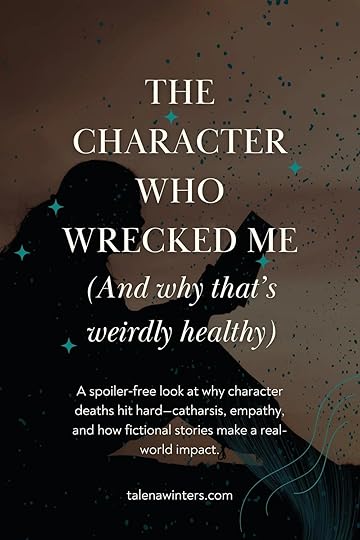 WIP Update: Every Rose that Blooms
WIP Update: Every Rose that Blooms 
I’m still doing okay for the Novel November challenge—I’m working on Chapter 10 (of around 25 total) for Every Rose that Blooms. You can now read up to Chapter 5 as early access!
Start ReadingNovember 6, 2025
Don’t Just Sit There: Risk Something
Do you have the potential to change the world?

“Every venture contains an element of risk.”— My dad, paraphrasing Allardyce T. Merriweather in Little Big Man
“Life contains a particle of risk.”— The actual quote, according to Google
For most of my life, I’ve been all about playing it safe. Physically, I mean. I’m not athletic, but thanks to my outdoorsy, active parents who took me on adventures before I could barely walk, I’ve had my fair share of close encounters with death.
And maybe that’s why, as I grew older, my tendency has always been to cocoon and let other more foolhardy souls risk life and limb. I was just fine reading about it, thank you.
But some of their adventurous spirit must have soaked into me, because I have been much less risk-averse when it comes to chasing dreams and taking chances in business. Has it been scary? Heck, yeah. Was it worth it?
Heck, yeah.
Here’s what I've found:
Risk Isn’t the Enemy—Fear Is“Yes, there have been times where something didn’t pay off. That’s part of the learning process. But you take what you learn and make better decisions next time. You risk better. And you get a better result.”
More often than not, the risks taken reap benefits, not whatever feared consequence might have stopped me. And the benefits are usually different than and better than I had even hoped for.
Yes, there have been times where something didn’t pay off. That’s part of the learning process. But you take what you learn and make better decisions next time. You risk better. And you get a better result.
I think that’s a key thing when taking a risk—don’t risk something you can’t afford to lose, because there is the possibility you might lose it. But risk as much as you can afford to lose, because then you have the potential to reap the greatest reward.
The Risk and the RewardI’m taking a stab and guessing you love to read about other people who take risks.
That’s what fiction and memoir are all about, after all. If someone doesn’t take a risk, then we don’t have much of a story. A person is presented with a challenge, and if they don’t accept it, then let’s close up shop, there’s nothing to see here, everyone go on home.
It’s the people who engage with risk that end up with a story worth telling.
As I’ve gotten older and learned a few things, I have also become less averse to taking physical risks.
While researching The Undine’s Tear, I decided that if we ever have access to an aikido instructor, I want to learn to do it. (I based the martial art of the undines on aikido.)
While researching Finding Heaven, I decided I’d love to try skydiving—once I no longer have dependents living at home (because there is the potential that I’ll lose).
My husband plans to hold me to that one.
He’s a much bigger physical risk-taker than me. I’m a much bigger business- and dream-chasing risk-taker than him.
But then, he’s taken more physical risks and has trained more than I have and has seen more success. And I’ve seen the rewards of taking personal risks more often, so essentially, I’ve had more “training” in that area than he has. We balance each other out and keep each other from getting stagnant in our own comfort zones.
Changing the World is RiskyWe need people in our lives who challenge us to go beyond where we are comfortable. We were made to push boundaries, to explore beyond what we know, and to change the world.
Don’t think one person can change the world?
Mahatma Ghandi, Rosa Parks, and Jesus Christ (to name only a few) would all disagree. But they didn't change the world by staying in the mould that was made for them. They took risks. Big ones.
Have you become a little too comfortable? Has it been a while since you felt that “I’m not sure if I know what I’m doing” feeling? Maybe it’s time to change that.
What’s Worth the Risk to You?We’re approaching the end of the year, and this is usually a good time to evaluate where you’ve been and decide if you need a change of direction. As you’re making your plans for next year, add at least one thing to your list that scares you.
You could even do one thing every day that scares you.
A small act of kindness that feels like a risk because it could be rejected. A larger act of putting yourself or your ideas out there. Learning something new. Hiking a new trail. Going to a new place. Meeting a new person and getting to know them. These are all risks.
It doesn’t have to be big. It just has to be something that pushes your comfort zone and trains you to risk better next time.
That’s how we grow, change, and keep becoming the people we have the potential to be. That’s how we end up with a story worth telling.
To me, that’s worth the risk.
“Do you want to be safe and good, or do you want to take a chance and be great?”— Jimmy Johnson, American football coach
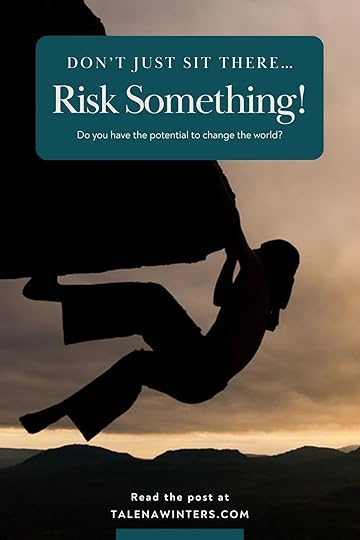
This post was originally published in the Books & Inspiration Newsletter on 2019-11-14.
WIP: A Heartwarming Love Story About Taking Risks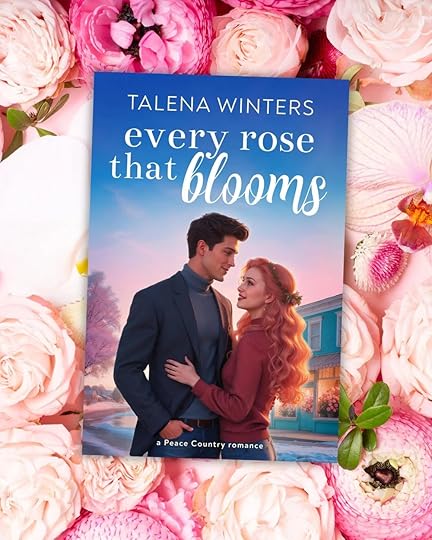
Speaking of taking risks, my current work-in-progress, Every Rose that Blooms (Peace Country Romance Book 3), is all about taking chances—on dreams, on love, on yourself. And I’m working hard to complete the first draft this month as part of the Novel November challenge. At six chapters and around 18k words in, I’m on track so far!
You can track my progress on the Books and Tea League member home page. (I’ll try to update it every day).
Even better, you can get early access to the book as a premium member. Check out the free first chapters to get started.
About Every Rose that BloomsSometimes the love you long for blooms right before your eyes.
Luke Anderson dreams of turning his side art hustle into a full-time business, but taking the leap feels as daunting as telling feisty florist Maddie Kennedy how he truly feels. After she proposes a creative partnership backed by an angel investor, he thinks he’ll finally get his opportunity. But when he discovers their silent partner is his charming rival, will Luke risk it all for the sake of their blossoming love?
Start reading for freeI can’t wait for you to meet Luke and Maddie. I hope their story makes you smile as much as it is while I’m writing it.
October 30, 2025
Diving Into the Artisanal Audiobook Process: The Two-Year (Hero’s) Journey to the Digitally-Narrated Edition of Finding Heaven
When I first wrote Finding Heaven, my women’s fiction novel about a woman healing from an abusive past, I expected it to take a while.
For one, it was my first full-length novel.
For another, since I started writing it only several months after losing my son, I was giving myself plenty of grace and time in the writing process when I needed it.
And it did take a while. Two years, to be exact.
By the time I’d finished, not only did I feel like I’d achieved something epic (because I had—the book clocks in at 163,000 words), but I’d become a different person as I wrote it. I’d learned a lot about myself while researching Sarah’s world. And I’d worked through a good chunk of my grief.
But when I started the digitally narrated audiobook of Finding Heaven in November 2023? Well, I knew it wouldn’t be a fast process to generate and proof 163,000 words of audio.
But I didn’t expect it to take another two years to get this far, either.
Yet, here we are.
So, before I go into the story of why, I should tell you: Finding Heaven is now available in audiobook .
At the moment, it’s for sale exclusively through my bookstore. Delivery is through the Bookfunnel app, which includes one of the best audiobook listening apps I’ve used. And it’s the same price as the eBook, which is a pretty amazing deal.
Okay, onto the story behind the creation of this book.
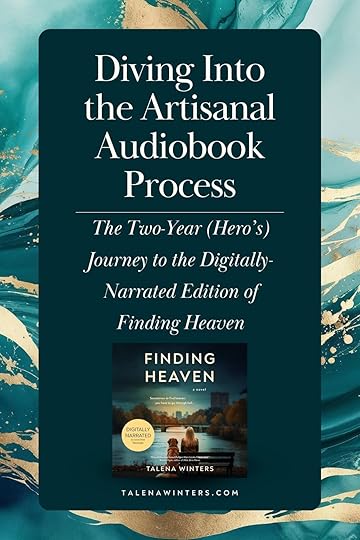 Rose-Tinted Beginnings
Rose-Tinted BeginningsThis is the first project I started using the premiere digital voice service ElevenLabs.
I was excited to work with their app, because I’d already completed a couple of projects using a couple of other digital narration services, and, as an audiobook lover, I’d been a little disappointed with the results.
Are those books better than simply using a “Read Aloud” feature in an eReader? Yes, they are. But they would never be confused with an actual human.
And I wanted this book to be the best I could afford to make it, while finally having an audio version in the world. (Eventually, I’d love to create human-narrated versions of all my books, but, given the high cost and the length of my books, it will be a while before that happens.)
So, I happily went through the process of “auditioning” AI voices for the job, and was stunned with the results. Soon, I was creating my chapters, a few per month, and posting them as early-access rewards in the Books and Tea League.
Back then, ElevenLabs had far fewer tools than they do now, so the process to get a good result was lengthy:
Generate the audio for the initial chapter.
Listen to the audio. Regenerate any paragraphs that included artifacts, distortions, and mispronunciations.
Download and make note of those “punch-in” clips to edit into the final track later.
While I was posting the unedited versions of the tracks as early access, I was still going through all of these steps for each chapter. Since they average twenty minutes in length, that meant, just to get that far, each chapter took about forty to sixty minutes of my time. When I got to editing, it would be another forty minutes or so per chapter (a process I went through completely when I later created the audiobook for Every Bell that Rings).
I was eleven chapters and three months in when ElevenLabs discontinued the primary voice I was using.
I was… well, devastated seems too strong and annoyed seems too peevish for my practical self, but maybe frustrated would be close to the right word. But, after allowing myself about five minutes to be upset and decide what to do next, I picked a new narrator and started over.
The Mushy MiddleThis time, I got twelve chapters in (for the second time) and realized I really didn’t like the male narrator I’d picked. He was pretty flat, and adjusting the settings to make him more expressive resulted in a lot of errors and artifacts per chapter—more than three times as many as my female narrator.
I decided I’d be better off choosing a new voice than having to deal with all those punch-ins for another 38+ chapters. By then, there were a few more options on the platform than when I’d started, but I still had a hard time finding one that was a good fit for audiobook narration and for Steve’s voice. Eventually, I selected someone who was “good enough”. But instead of starting over at that point, I just kept going, deciding to regenerate the first twelve chapters when I was done.
In retrospect, that turned out to be a good choice. Because, over the next year, ElevenLabs introduced more and better tools for editing that allowed me to regenerate smaller sections of text without using so many credits—and to allow me to download the completed, fixed chapter after instead of having to manually edit those in myself. (Supposedly, I can now even regenerate sections of sentences, but I find this never puts the appropriate silence after, so I still redo paragraphs at a time.)
I had finished Chapter 24 (nearly halfway) when I realized I no longer needed to download all those “punch-ins”. This sped up the process considerably.
But there were still another 26 chapters, an Epilogue, and all the back matter to go… plus, going back and fixing the first half of the book (and regenerating the first twelve chapters altogether).
By the time I finished generating the first draft a couple weeks ago (which was basically the equivalent of a draft-and-a-half with all the chapters I had to redo), I was two years into the project, and weary of revisiting a story that I’d written so long ago instead of working on something new in my limited “writing time”.
But I wasn’t done yet.
The Final ActAudiobook publishers (even Bookfunnel) require files to meet stringent technical standards for audio quality and encryption. While my ElevenLabs plan allows me to export a single book-long file for publication on specific platforms that meet those standards, the individual chapters I’d downloaded as I went for use on other platforms did not. The metadata (information like cover image, track number, etc.) attached to them needed to be updated, as well.
I didn’t see that as a problem, since I have the skills and technology to engineer those final steps myself.
But, when I pulled those chapters into my DAW to upgrade the encryption, I discovered other issues: some of the files were corrupted and sounded like white noise. Others (many others) cut off the last several seconds of the chapter. And none of them included enough silence at the end of the chapter.
So… back I went to ElevenLabs, re-exporting the offending files. Unfortunately, this turned the final steps of this process from something I thought would take a few hours into something that took a day and a half.
Boy, was I glad to be finished with that!
Which I was, as of Tuesday afternoon.
As of Wednesday night, Finding Heaven was live for sale in my bookstore.
Which means, at long last, you can enjoy the fruits of all that labour.
Here’s a sample to get you started:
What’s NextEarlier this year, I’d thought I might release this audiobook as part of my planned Kickstarter for a special edition of Finding Heaven. But, after all the setbacks during the creation process (and knowing that Kickstarter isn’t a platform that especially celebrates audiobooks), I just wanted to be done with this stage of the project, so I decided to release it right away instead.
At the moment, it’s only available in my own shop. Eventually, I may also publish it to Google Play Books and Kobo.
Currently, I’m using the matching cover that I launched for the eBook earlier this year:
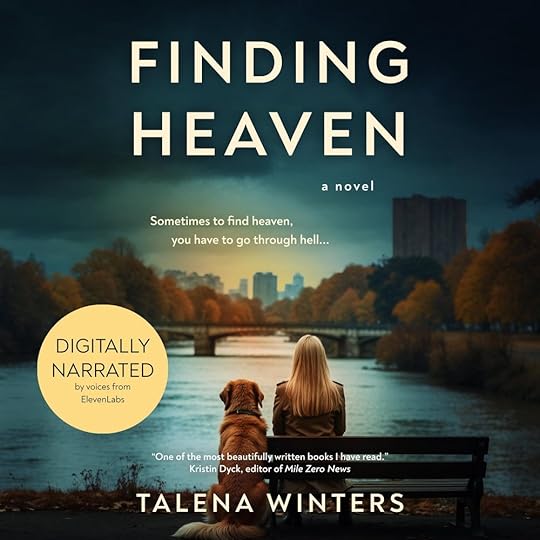
I’m very glad to have my “writing time” back, and I’ve already started drafting the manuscript for my next release, Every Rose the Blooms (Peace Country Romance Book 3), which will soon be released chapter-by-chapter in an early access version for Books and Tea League members.
And, now that this audiobook project is done, I’ll be preparing the special edition for the Kickstarter, which I intend to launch early next year. (I’ve already started reformatting the interior!)
Coming Up for AirFinishing this audiobook feels a bit like surfacing after a long dive. It took far longer than I ever expected, but I’m proud of what it became, and I’m thrilled to finally share it with you.
If you’ve been waiting to experience Sarah and Steve’s journey in audio—or if you’re curious what’s possible with thoughtfully crafted digital narration—now is your chance.
🎧 Listen to Finding HeavenAvailable exclusively in my shop. Delivered through Bookfunnel’s excellent listening app.
Get the AudiobookThank you for being here for every twist and restart along the way. I hope this story meets you where you are and reminds you, as it reminded me, that healing takes time—and hope is worth holding onto.
Happy listening. 💛
(And I’d love to hear what you think of the audio quality. Let me know in the comments!)
What Readers SayThis book was originally published on November 14, 2017—almost exactly eight years ago. Since then, it has been loved by hundreds (maybe thousands?) of readers. Here are a few nice things they’ve said:
“The best novel I’ve read in a long time.”“One of the most beautifully written books I have read.”
“A riveting, true-to-life tale of love’s power to heal and redeem.”
“The tears are how you know it’s good!”
“This book is a page-turner!”
“A moving and beautiful story of accepting who you are, overcoming the past, and embracing the future.”
“One of the best novels I’ve read in a long time.”
“It’s about unearthing the real you after being under the mudslide for so long. It still tugs at my heartstrings.”
“Masterful.”
“A long read, but I couldn’t put it down—read it in one sitting. A visceral book that settles into your gut and requires ‘book hangover’ time to digest. Recommended.”
“One of those books you stay up late into the night reading, unable to put down. Inspirational and touching.”
“This well-written story touched my heart and kept me turning the pages to the very end.”
“I was on the edge of my seat—unable to put it down. It brought out so many emotions—tears of sorrow, tears of joy, a longing to have a Steve in my life.”
“This book grasped my attention right from the beginning and did not let go at the end. It is extremely well written for the gritty and delicate subjects it covers.”
“Very well written. Kept my interest from the very beginning. Made my heart ache, rage, feel hope, and love.”
“Excellent true to life story about healing from the hurts of so many levels of abuse, about learning to love and accept yourself, about discovering true and unconditional love and discovering purpose for life.”
“A book well worth reading.”
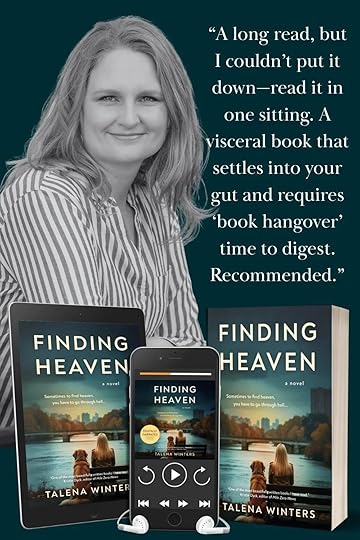
October 23, 2025
Behind the Name 2: How I Name Characters in my Mermaid Fantasy Series
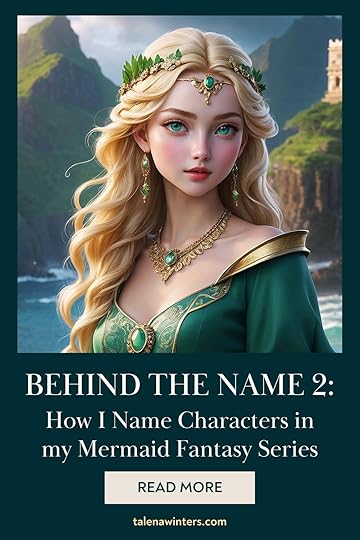
When I name a character, I rarely just go with whatever sounds cool. A name has weight—it carries culture, meaning, and a sense of belonging in the world. So, when I’m choosing one, I ask myself a few questions:
Where did this name come from? Would someone with this background realistically have it?
What does it mean, and does that meaning reflect who the character is or what they represent?
Can my (mostly English-speaking) readers pronounce it without needing a PhD in linguistics?
Because the epic mermaid fantasy Rise of the Grigori series pulls from so many languages and mythologies, I spend a lot of time balancing accuracy with readability. Here’s a peek behind the curtain at a few of the choices that shaped my cast.
Calandra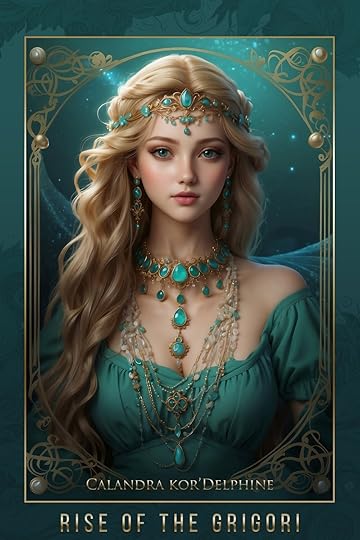
Calandra kor’Delphine, Rise of the Grigori. Explore her character wiki here.
A Greek name meaning lark. Since Calandra is an undine (mermaid) whose magic is expressed through her voice, naming her after a songbird felt perfect. It’s lyrical, unique, and easy to pronounce—three boxes I like to tick. Most undines have Greek names, though there are exceptions, reflecting the influence of humans in their world.
Zale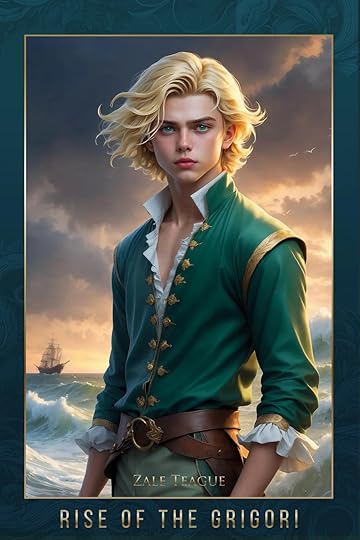
Zale Teague, Rise of the Grigori. Explore his character wiki here.
Zale means sea strength in Greek, which couldn’t be more fitting for the hero who grew up by the Cornish coast. In an earlier version of the story, Zale’s name was Carlos—back when he was raised in Portugal. But researching 18th-century Portuguese peasant life turned out to be a nightmare, and I eventually moved his upbringing to Cornwall, which already has its own mermaid legends (refer to the Mermaid of Zennor).
The name change also solved a readability issue—two main characters with names starting with C (Calandra and Carlos) was confusing, especially for readers with dyslexia or ADHD. When I found “Zale,” it clicked instantly. It was strong, unusual, and unmistakably him—and gave a nod to the Greek culture his undine mother grew up in.
Narcissa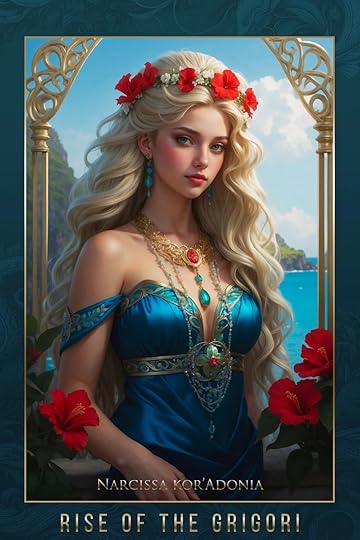
Narcissa kor’Adonia, Rise of the Grigori. Explore her character wiki here.
A reviewer once called this name “on the nose,” and honestly… fair. But when you have a narcissistic, manipulative character, why pretend otherwise? Narcissa (from the Greek narkissos, meaning “narcissus”) is as beautiful as she is self-absorbed, and that’s the point.
Damon
This not-totally accurate illustration is the closest thing I have to an image of Damon. Get this design on a mug here.
When Semyaza—the story’s primary antagonist—first appears, it’s in Calandra’s dream, disguised as one of her own kind, calling himself Damon. He hides everything except his golden eyes, which betray his true nature. The name Damon literally means demon, so it’s a subtle clue from the start that he’s not what he seems.
Semyaza, by the way, is drawn from the Book of Enoch, a non-canonical text that names him as one of the fallen Watchers. If you’re curious how I weave biblical mythology into this world, I dig into that more in this post.
Abela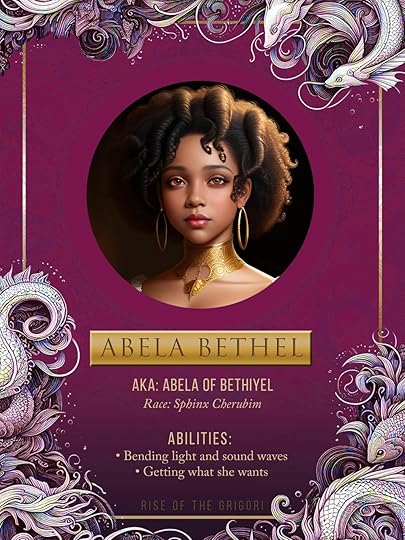
Abela Bethel, Rise of the Grigori. Get more art featuring Abela here.
Zale’s guardian cherubim, Abela, first appears under another name—Talwyn, a Welsh name meaning peaceful. I chose it simply because I liked it, and it made sense geographically. When she reappears as Abela, though, her name becomes more symbolic.
“Abela” is Hebrew for breath, the same word used for the Holy Spirit—and it also carries meanings like noble, bright, and strong. Those nuances fit her perfectly: an otherworldly protector whose very existence challenges the racial and social hierarchies of her world.
The ChapmansWhen it comes to family names, I try to stay historically accurate while being respectful of real-world families who share those surnames. My goal is to honour the period and culture without implying anything about actual historical or modern families.
In the case of the Romani Chapman clan, I originally used “Stanley,” another real Romanichal family name, before switching. It may have been due to regional research, but either way, “Chapman” fit just as well.
For the Romani first names, I drew on documented naming patterns from the 18th and 19th centuries, which included Roman-inspired names (Lucius, Britannia) alongside others adopted through cultural blending (Eric, Josefine, Gio). The Romani have always adapted to the cultures around them, and I wanted their names to reflect that.
And then there’s Marin Stanley—who appears at the end of The Sphinx’s Heart and will play a larger role in future volumes. Let’s just say her name’s connection to the sea isn’t an accident. (No spoilers.)
For more about how the Romani figure into this series and why, refer to this post.
Choosing names might seem like a small detail, but to me, it’s part of the storytelling—each one adds a layer of meaning, history, or foreshadowing.
If there’s a name from the series you’ve been curious about—drop it in the comments! I might feature it in the next “Behind the Name” installment.
Want to learn more?
Mermaids. Magic. And a search for redemption that could tear the world apart…
Three thousand years ago, a Mad undine healer sank Atlantis. Ever since, the Heartstone that protects the undines’ island has been failing and they haven’t produced a single boy. As the most powerful healer in three millennia, Calandra is the last hope of not only her people, but the entire world. Because if she can’t figure out how to undo her ancestor’s mistake, the Father of Lies will unleash hell on Earth.
Packed with complex characters, lush world-building, gritty action, and impossible odds, this intricately woven epic fantasy series presents mermaids and dragons like you’ve never seen them before.
Join Calandra in a search for redemption that could threaten the very fabric of the universe!
Learn more Other posts in this blog series: A new song for mermaid fantasy loversThis week, I released a song inspired by Rise of the Grigori called “Redemption (Raise the Tide)”, a cinematic rock anthem about Calandra’s fight for the freedom and truth her island (and the world) needs. You can check it out in here (currently still early access for Books and Tea League members).
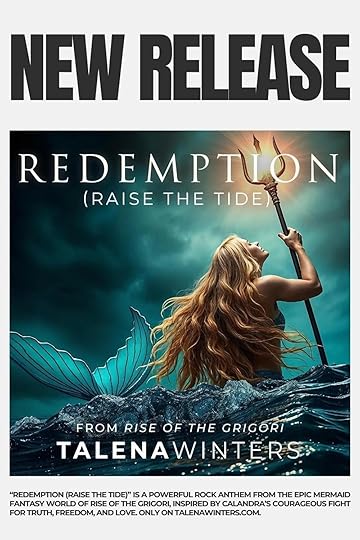
New release: “Redemption (Raise the Tide)” is a powerful rock anthem from the epic mermaid fantasy world of Rise of the Grigori, inspired by Calandra’s courageous fight for truth, freedom, and love.
The other song from the series that I released a couple weeks ago, “Elyon’s Children (A Mermaid Lullaby)” is now public too.
Enjoy!
October 16, 2025
The Power of No: How Boundaries Create a Better Yes
Are you saying “yes” to the right things?
This post contains affiliate links. That means, if you click through and make a qualifying purchase, I make a few cents at no extra cost to you.

“Daring to set boundaries is about having the courage to love ourselves, even when we risk disappointing others.”— Brené Brown
I’ve been saying “no” a lot lately.
Every parent of young children out there is like, “So what? I said ‘no’ fifty times before breakfast.”
I’m not talking about setting boundaries for our children, who have not yet learned to set boundaries for themselves. I’m talking about a ground-breaking next step in my own personal boundary-setting—saying no when I’d really like to say yes.
In other words, saying no to friends. And myself.
I’ve been a Boundary Evangelist for a couple of years now, and this is primarily because of how establishing boundaries has made my life so much better. It has produced guidelines, safe spaces, and order, and saved my sanity (literally).
When I read Boundaries by Henry Cloud and John Townsend in 2017, I discovered that I actually had some pretty strong boundary-setting muscles already. What I lacked was the understanding of how setting those boundaries was the right and loving thing to do. As a result, I felt an extreme amount of guilt every time I set one (and I usually set it long past the point I should have).
Does this sound familiar to you?
Last week, a wonderful young entrepreneur in my community started a Facebook group to support working women, many of whom own their own businesses, and one of the questions that came up several times was how to manage overwhelm and to create work-life balance.
Ah, the mythical work-life balance. While I’m not going to pretend to have achieved this hypothetical state of perfect zen, I’ve been coming a lot closer lately, and that’s because I’ve set boundaries, even when I haven’t wanted to.
For me, that looks like setting working hours that allow me time to accomplish my work and still spend time with my family and on self-care—and then sticking to them with almost religious fervour.
Okay, I’m not that much of a stickler. And I frequently think about work when I’m on my off hours and, back when I needed to work in the evenings to get it all done, I’d feel guilty for working while my family was home, even though those hours were set aside for that activity.
But perhaps it is that balancing act that has recently made it much easier to step away from requests that would require me to give up time with my family. (Even if the other option was to do some other really good and fun thing that my brain stared at like my dogs stare at the pan of bacon fat I give them after breakfast until I give them permission to have it.)
I balanced the opportunities I was presented with against what I'd rather be saying “yes” to—an afternoon with my kids or a night out with my hubby. And I chose the latter.
I’m not going to lie, it was hard to do. But the moment I did it, I felt so much better—because if I’d said yes, I would have resented the time I was giving to that project instead of the activities I had already decided should have had priority.
When this topic came up on Facebook, I shared a response that seemed old to me, like a mantra I’ve almost fully accepted into my own psyche, but it was new to several of them, so I want to say it again here in case you need to hear it, too:
“When it comes to pursuing dreams, achieving goals, or so-called work-life balance, no is the magic word.”
When you say no to something, you are actually saying yes to something else.
You are saying yes to something you’ve already decided has value and that you want in your life.
The opposite is also true. If you say yes to something, you are saying no to something else you’ve already accepted into your life.
Make sure your "yeses" are for the things that matter most to you.
Is it easy? No.
Is it necessary?
Yes. :-)
Like the yin-yang, every no is actually a yes. This is the paradox that can revolutionize your life.
Because when it comes to pursuing dreams, achieving goals, or so-called work-life balance, no is the magic word.
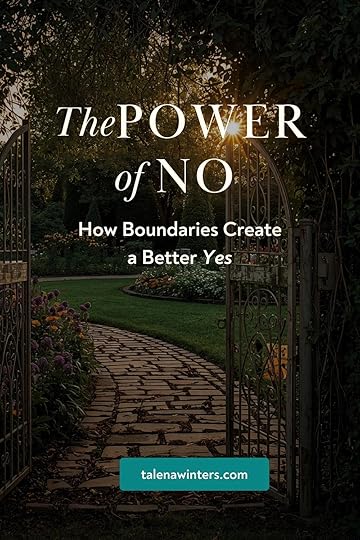
This post was originally published in the Books & Inspiration Newsletter on 2019-10-22. Sign up to get inspiration in your inbox .
Music News for Fantasy ReadersIf you’ve read my Rise of the Grigori epic mermaid fantasy series, you’ve seen the lyrics for the lullaby that helps uncover hidden secrets from the past ().
Well, now you can listen to it, too.
“Elyon’s Children (A Mermaid Lullaby)” is currently available as early access for members of the Books and Tea League. Check it out below.
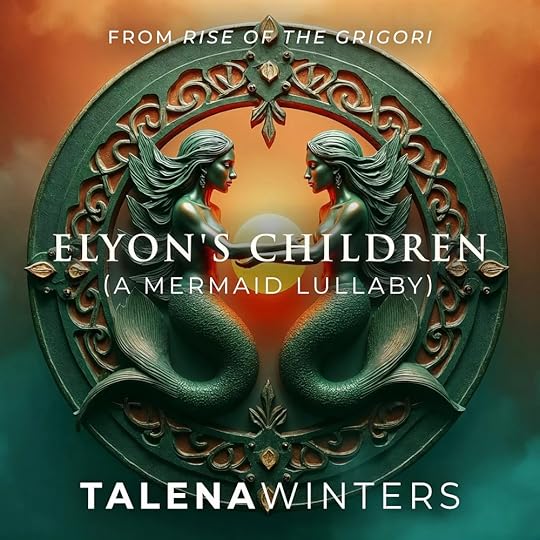
New release: A Celtic-inspired siren melody called "Elyon's Children (A Mermaid Lullaby)" from the epic mermaid fantasy series Rise of the Grigori. Books and song by author-musician Talena Winters.
October 9, 2025
Fall in Love this Fall: 3 Faith-Infused Romantic Novels from Clean and Sweet to Gritty and Redemptive

Autumn is my favourite season. I love the colours, the crisp air, the sweaters, the cozy hot beverages—and the books!
Something about fall asks for stories about transformations, second chances, and the small brave choices that change a life. That’s why so many of my books are set in this season. Autumn is the perfect backdrop for love that grows slowly, hope that sneaks up on you, and healing that happens in public places and quiet rooms alike.
Below are three novels that are all full of heart and hope but evoke very different vibes: from cozy, small‑town sweetness to a raw, redemptive journey.
All are low on sensuality. All take emotional risks—grief, loss, betrayal, recovery—handled with care. Pick the mood you want for your fall reading.
Every Star that Shines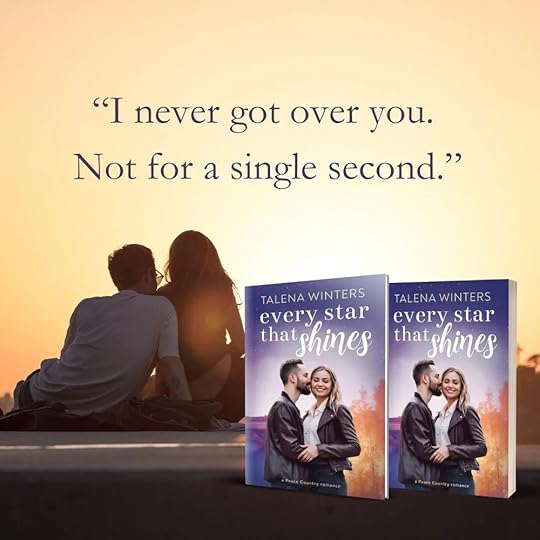
When I wrote Every Star that Shines, I wanted to tell a small‑town story inspired by the resourceful, open‑hearted people I came to know while living and writing in northern Alberta. It’s the first book in the Peace Country Romance series—a love letter to the place and people who taught me about grit, kindness, and community.
This book is cozy, clean, and emotionally real. It’s sweet small‑town romance with depth—characters who’ve been hurt but aren’t defined by it. Think hot chocolate, small town kids theatre, northern lights, a charming child, and two former sweethearts remembering who they were.
About the book:Delanie returns to Peace Crossing after a public fall from grace to bury the grandmother who inspired her acting dream and to direct the town play. Reuniting with Caleb—the high‑school love she left behind—causes both of them to reckon with past choices and the reasons they fell for each other in the first place.
Fans of Debbie Macomber, Rachel Hauck, Rachael Bloome, Melissa Tagg, Becky Wade, and Courtney Walsh will enjoy the sweet, cozy small-town vibes with intricate family dynamics and complex and interesting character journeys.
Content levels: Low sensuality; deals with real‑life hurts (grief, betrayal, career fallout) without graphic content. Mild faith presence—hopeful, gently infused values.
What Readers Say:“What a cute story! Realistic, charming characters, a lot of sweet, heartfelt moments, and a HEA. Great choice!”
“The perfect mix of warmth and romance. Highly recommended for fans of sweet second-chance love stories!”
“Endearing characters, a beautifully executed plot, and a homey fall setting. A great read!”
Dive into the Peace Country Romance series with this sweet and clean, charming fall second chance romance:
Learn More about Every Star that Shines The Friday Night Date Dress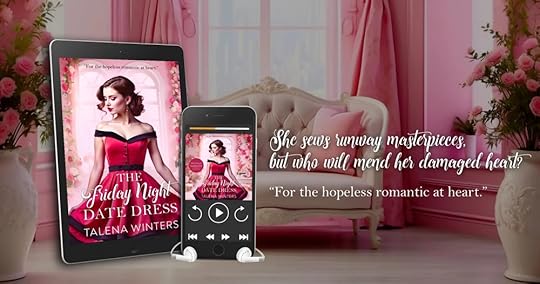
The Friday Night Date Dress was my first novel, created while taking a how‑to‑write fiction course and sparked by the question, What would make someone become a self‑taught couture designer?
What began as a short story turned into a 23k novella, later expanded to 27k words. It was practice that turned into a reader favourite.
This story is playful and poignant, with elements that include sewing as therapy (with a ton of gorgeous dresses!), an unusual Friday night grief ritual, and the gentle friendship of Peter, who encourages the grieving Melinda to learn to live again. This story has delighted thousands of readers, and it’s available free when you sign up for my newsletter.
About the book:After suffering tragic loss, Melinda pours her grief into creating couture masterpieces she wears only once. Can aspiring fashion photographer Peter break through her protective shell and bring her back to life?
Perfect for fans of Barbara O’Neal, Beth Moran, Fannie Flagg, and Kristen Billerbeck.
Content levels: Low sensuality; light faith elements; explores grief and slow‑burn romance and healing but contains no graphic content.
What readers say:“A sweet, sad, moving, interesting story. A rare 5 stars.”
“Great read for the hopeless romantic at heart.”
“I was expecting sweet and sappy, but was an emotional wreck reading this. Once I started, I was HOOKED.”
Get The Friday Night Date Dress free with newsletter signup:
Learn more about The Friday Night Date Dress Finding Heaven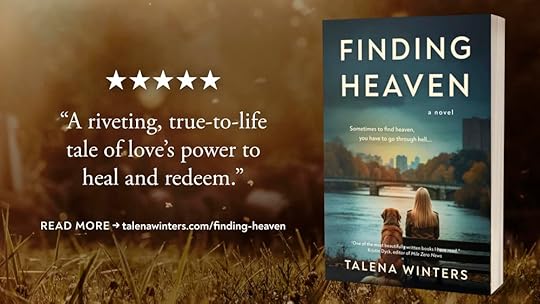
I wrote Finding Heaven while grieving the sudden, tragic loss of my three‑year‑old son. It became a way to work through grief while telling a meaningful story drawn from real life. The plot and setting are informed by my husband’s and my missions work in India, research into sex‑trafficking rescue work (inspired by books like Three Cups of Tea by Greg Mortenson and Bombay Smiles by Jaume Sanllorente), a close friend’s cancer survival, and a research trip to Mumbai in 2016. (I’m also intimately familiar with the San Francisco Starbucks location in the opening scene.) Real testimonies and deep research shaped even the most miraculous elements in the story.
This book is an honest, faith‑rooted tale of redemptive love and healing that doesn’t shy away from the darkness it explores. The realism of the setting and the authenticity of the characters’ journeys give the book its emotional weight.
About the book:Author Sarah Daniels feels trapped in a living hell but thinks she deserves her life—until an enigmatic and compassionate stranger invites her to choose a different future. But is it too late for Sarah to find heaven?
A great choice for fans of Francine Rivers, Katie Ganshert, Lynette Eason, Colleen Coble, and even Lysa TerKeurst.
Content levels (important—please read): High intensity. This book contains graphic descriptions of violence, including sexual violence, and both past and present physical and sexual abuse. It is faith‑infused and ultimately redemptive, but reader discretion is strongly advised.
What readers say:“One of the most beautifully written books I have read.”
“A riveting, true-to-life tale of love’s power to heal and redeem.”
“A moving and beautiful story of accepting who you are, overcoming the past, and embracing the future.”
“One of the best novels I’ve read in a long time.”
“It’s about unearthing the real you after being under the mudslide for so long. It still tugs at my heartstrings.”
“A long read, but I couldn’t put it down—read it in one sitting. A visceral book that settles into your gut and requires ‘book hangover’ time to digest. Recommended.”
“One of those books you stay up late into the night reading, unable to put down. Inspirational and touching.”
Learn more about Finding Heaven and its inspiration:
Learn more about Finding HeavenThese three books share the common themes of redemption, hope toward healing, and the belief that people can change and be changed by love, community, and grace.
If you want a cozy, clean small‑town escape for a crisp evening, start with Every Star that Shines.
If you’d like something short, warm, and character‑driven, try The Friday Night Date Dress (and grab it free with newsletter signup).
If you’re ready for a deeper, rawer read that follows a redemptive arc through very hard places, consider Finding Heaven—but note the content warning.
Which fall reading mood fits you tonight? Click the book that calls to you, or sign up for my newsletter for reading extras and a free novella or two.
Get Newsletter
October 2, 2025
How to Have Hope in Uncertain Times
The past several weeks have seen several major heartbreaking events in world news that have fundamentally shifted the way many people think and relate to each other. I’ve also been taking some time to reflect, and while I’m going to leave any political commentary off this blog, I will share what I’ve concluded:
Now, more than ever, I need to put my energy into the things that matter most.
Family has always been a high priority to me. But, more often than not in my business, I’ve let myself be distracted by things that haven’t been part of my higher purpose.
You see, I’ve always considered my books to be more than entertainment. To me, they, and the hope and messages they contain, are part of my higher calling as a Christian and a person. My business is also my ministry.
And while the world feels more uncertain every day, God is solidifying a certainty in me about the importance of my calling and mission.
In my last post, I mentioned the strategic changes I’ve been making to my business this year that have created a bit more stability. I feel God has directed me to implement those changes to set me up to now be able to focus on writing fiction again, because that’s where he’s called me to work in this season of my life.
For Such a Time as This
Esther, Queen of Persia, ready to face Xerxes for the sake of her people.
The biblical book of Esther is about a young Jewish girl whose family is part of the Jewish diaspora in Persia during the time of King Xerxes (the enemy king in the movie 300).
At only fourteen years old, she is torn from her family to compete with hundreds of other girls to be the queen of a vain, selfish, narcissistic, heathen king—not even as his primary wife, but as one of several. “Losing” would mean being added to the king’s harem, never to leave, living out her days in isolation from her family. “Winning” wasn’t much better—it might come with a nominal crown, but very little power or influence outside the walls of her own home.
The “beauty contest” was a clever distraction for this volatile, dangerous ruler designed by his counselors, after he’d executed his previous favourite wife, Vashti, for making him lose face, and then subsequently experiencing a devastating loss at the hands of the Greeks. Against all odds, Esther is the one chosen.
Years later, the Xerxes was manipulated by one of his advisers, Haman (whose people had an ancient grudge against the Jews), into signing a decree that allowed anyone in Persia to slaughter all the Jews they could on a single day (determined by the casting of lots).
In that moment, Esther’s cousin (and foster father), Mordecai, urges her to go before the king and beg for her life and the lives of all her people. By then, Esther had fallen out of favour, and going before the Persian king uninvited was a law punishable by death.
In fear, she tries to decline, and Mordecai writes to her:
“Do not think to yourself that in the king’s palace you will escape any more than all the other Jews. For if you keep silent at this time, relief and deliverance will rise for the Jews from another place, but you and your father’s house will perish. And who knows whether you have not come to the kingdom for such a time as this?” – Esther 4: 13-14, ESV
Esther’s courageous response is one of the most inspiring verses in the Bible:
Then Esther told them to reply to Mordecai, “Go, gather all the Jews to be found in Susa, and hold a fast on my behalf, and do not eat or drink for three days, night or day. I and my young women will also fast as you do. Then I will go to the king, though it is against the law, and if I perish, I perish.” – Esther 4: 15-16, ESV
This book of the Bible has always been among my favourites, to the point that I even co-wrote an entire Broadway-style musical about it. And this passage here is the key moment of the story—the Truth that the entire story points to.
When times are dark, it is time for people of faith to stand up and shine the light of hope. Not because victory is assured—it’s not—but because it’s the reason we’ve been given that light in the first place.
“When times are dark, it is time for people of faith to stand up and shine the light of hope. Not because victory is assured—it’s not—but because it’s the reason we’ve been given that light in the first place.”
And that is the conviction I’ve been feeling stir in the world, and in my heart, over the past little while.
There is a hope that is greater than the problems of this world. It’s the hope I talk about in every one of my books. It’s the hope that guides my life—and that is the hope I have in Jesus Christ. If you’re looking for hope in these dark times, I urge you to look to Jesus. Talk to him, and acknowledge that you’re a sinner who is lost without him. Ask him to come be lord of your life.
Is believing in Jesus the magic cure for everything wrong in the world?
Nope. (Well, if everyone did, it would be.)
But Jesus is the way, the truth, and the life. And he’s waiting to bring truth and life to you, that you may have life abundantly.
Trust me, the escalating disasters in our world are so much easier to face with courage when your hope is in the One whose hand guides history. He’s the God who redeems all the brokenness into beauty, including the brokenness in our own hearts.
Much love, my friend. I pray you may also know this hope I have in Jesus.
P.S. Esther is a short but amazing book. You can read the whole story here.

September 29, 2025
Rise of the Grigori Book 3 Changes Titles—Again
Earlier this year (I think? or last year), I polled my newsletter readers about the title of the third book in my epic mermaid fantasy Rise of the Grigori series.

The promo banner I made for Book 3 while trying to decide whether to call it The Romani’s Curse or The Romani’s Oath.
Between The Romani’s Curse and The Romani’s Oath, the votes were almost evenly split. I opted (at the time) to go with “curse”.
However, I’ve decided to make one further tweak to the title. Here’s why:
I have four books planned in this series. Each book title uses one of the four “races” in my world, as well as a significant object for that title’s story. So far, we have The Undine’s Tear and The Sphinx’s Heart. Undines are my mermaid race, and sphinxes are one of the forms cherubim in my books can take (and yes, this representation of cherubim is based on biblical references, which you can read more about in this post).
There are two other significant races: seraphim (which can manifest as dragons) and humans. And, for anyone who has read the books, you know that the Romani human characters figure significantly in the plot, as both allies and antagonists of our protagonists.
That being said, much like I want to write about the spiritual beliefs I use in my story with respect, I want to ensure I do the same for the real-world people my stories incorporate.
Representation with Respect
Francis Wheatley, born in London, England, 1747; active in England and Ireland; died in London, England, 1801, A Romany Encampment, ca. 1790, Oil on canvas, Yale Center for British Art, Gift of Elliot Sussman, MD, MBA, Yale BA 1973, B2017.27.
My research into the Romani people for this series has made it clear to me that this people group has a fairly complicated history, in which they’ve had to do a lot of things to survive.
They’re very good at surviving!
Despite centuries of nomadism across multiple continents (or maybe because of it) while facing constant mistrust and even outright violence from the peoples around them, they’ve managed to maintain a distinct identity, pride, faith, and even language.
The Romani have had to deal with attempts to expel, exterminate, or assimilate them everywhere they’ve gone. Along with the Jews, the Roma were nearly exterminated in Germany during the Holocaust. To this day, many Roma people in various places (especially in the UK and Europe) still have a very uneasy relationship with the countries where they reside.
While many people in real life treat the Roma with suspicion and distrust, seeing them as thieves, swindlers, and other unsavoury descriptors, they have an alternative, more romanticized reputation.
Begun in the highly romantic Victorian era and its ideals of being close to nature (and probably escalated by the Roma adopting colourful vardos, or caravans, as mobile homes in the middle of the nineteenth century) and fostered by their representation in fiction—especially fantasy books—this picture often paints the Roma as mysterious, alluring, and seductive.
While many Roma are not above using this image to their advantage when it suits (they’re survivors, remember), it can do as much harm in its way as the other stereotype.

The title and contents of this print portray how white Europeans often saw Romani in the 19th century—cunning, sly, lascivious, and “uncivilized”—therefore, immoral. Only some of those things were true—or more true for Romani than their white neighbours. (Their cunning is one of their survival skills.)
William T. Annis, active 1798–1811, The Cunning Gypsy, 1802, Mezzotint, Yale Center for British Art, Paul Mellon Collection, B1977.14.14460.
I confess that when I first brought the Roma into my story, it was as someone ignorant of all these things. I was looking for a plot device to help a young Zale escape from a difficult situation his manifesting powers had created that would make him hard to find for the five year interim between that and the events of The Undine’s Tear.
One of my critique partners at the time, talented Regency romance author Jessica L. Jackson, kindly pointed out the harmful stereotypes I’d employed in the first draft of The Waterboy—which sent me down a rabbit hole of research and my story through a great deal of revision to try to address them.

In The Waterboy, one of Zale’s Romani companions offers to tell his fortune—a “skill” many Romani would use to separate gorgios, or non-Romani people, from their money in a manner that would not cause ill will from their customers. Sometimes, they may even have believed what they told the gorgios. ;-)
Paul Sandby, 1731–1809, The Gypsy Fortune-Teller, ca. 1758, Watercolor and graphite with pen and black ink on medium, slightly textured, cream wove paper, Yale Center for British Art, Paul Mellon Collection, B1977.14.5950.
This is the reason I changed my original planned title from The Gypsy’s Secret to The Romani’s Curse—to prevent perpetuating the harmful representations of the Roma in my work, and to avoid using Gypsy in my title, which is considered a slur, especially in the UK.
However, as I’ve continued to develop this story, I felt using the word Romani in the title of Book 3 was still leaning into romanticizing their identity a bit more than their humanity. I also wanted the title to be more indicative of the conflict the story will contain. (And I really, really wanted only two syllables in the second word.)
So, I’m going to be calling this book The Healer’s Curse.
Hopefully, this will be the last title change for this volume. 🙂
Coming SoonI just completed my quarterly week “off”. I put that in quotation marks, because I spent most of the week recovering from a cold, and I was also catching up on some freelance work when I had the brain cells to do so.
However, by Friday, I was also able to do the quarterly planning that is part of the point of having this week of rest. The slight break from routine and daily grind of running my business gives my brain the space to think about the goals I did or did not achieve in the previous quarter, and where I want to go next.
I’m thrilled that I actually accomplished almost everything I intended to in the last quarter.
I’m even more thrilled that, thanks to the pivots and shifts I’ve slowly been making this year, I’m finally free to focus more on producing fiction this winter.
One of the things I’ve learned about myself is that when I’m facing a lot of uncertainty, I struggle to be creative. Which is why I put so much of my time and energy this year into creating a more stable income base for my business.
Now that I’m seeing that start to pay off, my brain is free to dedicate itself to play again.
First up: drafting Every Rose that Blooms (Peace Country Romance Book 3).
Next: The Healer’s Curse (Rise of the Grigori Book 3).
Music Updates
“Help Me Find the Words” is streaming everywhere starting tomorrow (October 1).
Be sure to add it to your playlists!
Or you can listen, download, and support here.
Upcoming Book-Related MusicI’m working on two songs related to the Rise of the Grigori series—one of them is the lullaby that figures so prominently into the plot (), and another is a rock anthem inspired by the main series protagonist, Calandra.
More info coming soon!
What do you think of my new title, The Healer’s Curse? Let me know in the comments!
September 11, 2025
Behind the Name 1: The Hidden Names of the Trinity in My Epic Mermaid Fantasy

Names have power. In my epic mermaid fantasy series Rise of the Grigori, the undines whisper ancient names in their prayers—Atargatis, Inanna, Venus. To them, these are the faces of the Mother Goddess who brought their people into being. But hidden beneath the tides of memory are other names, more foreign and dangerous to their ears: Elyon. Logos. Pneuma.
To undines, the idea of a male God is a shock. To discover that He is not only male but also relational—Father, Son, and Spirit—is almost unthinkable. These names, and what they reveal, change everything.
Why These Names Matter (to Me and My Story)When I began writing this series, I knew I didn’t want to replicate the spiritual cosmologies I so often saw in fantasy, depicting a God who is distant, cold, cruel, or simply absent. To me, those portrayals always felt more pagan than biblical—reflecting bitterness, or perhaps disillusionment, rather than the heart of the God I know and love.
For me, God has always been deeply personal—present in both joy and grief, he is righteous yet tender, strong yet merciful. I wanted my worldbuilding to echo that reality. So when I chose to weave the names of God into this story, it wasn’t just a flourish of borrowed mythos. It was my way of grounding the spiritual soul of this fantasy world in something true and meaningful.
Each of the names I gave my undines to wrestle with carries a weight that shapes not only their theology but also their destinies.
The Names and Their ConnectionsAt the end of Book 1, The Undine’s Tear, I introduce the following lullaby, familiar to every undine child on Sirenia:
In the night, the Dragon waits to ravage in the dark
But Elyon will shield the ones who bear his watermark
In the light, the em'rald-eyed protectors of the deep
Will, ever vigilant, defend the gates of Elyon's keep.
The dragons and the cherubim and undines all as one
Will love and celebrate the race to whom he sent his son.
But, much like the origins of playground songs and nursery rhymes like “Ring Around the Rosie”, “Mary, Mary, Quite Contrary”, and “Rock-a-bye Baby” have been lost to time and have hotly debated meanings, the undines find this lullaby nonsensical.
That is, until Calandra, my heroine, starts investigating the mystery of her people’s true past. What was once nonsense becomes a cipher. The names embedded in its lines unlock the story her people forgot—and the destiny she must face.
Elyon: “The Most High” (God the Father)Verse:Original Hebrew:“They remembered that God (Elyon) was their rock, the Most High (Elyon) God their redeemer.” – Psalm 78:35 (ESV)
Elyon (עֶלְיוֹן) – “Most High,” emphasizing God’s supreme sovereignty and exalted position over all creation.
Meaning for my world:Elyon represents the loving, omnipotent Creator who watches over and infuses all layers of the cosmos, including the undines, and whose care underlies the moral and spiritual order of the universe.
The Impact of Elyon:The name Elyon echoes in undine lullabies, a word half-forgotten and half-feared. To the undines, who worship a female First Mother and fear men—especially men with power—the idea of a male Most High God is both alien and unsettling. Elyon suggests authority and intimacy at once—a God who rules over all creation but who also claims His people as His own.
But for Zale, raised in the human world under 1790s Methodist teaching, Elyon is both terrifying and reassuring. If God is Most High and created Zale for a specific purpose, then even his mistakes—and his blood-soaked past—are not beyond redemption.
The Logos: “The Word” (God the Son)Verse:Original Greek:“In the beginning was the Word (Logos), and the Word (Logos) was with God, and the Word (Logos) was God.” – John 1:1 (ESV)
Logos (Λόγος) – “Word, reason, principle.” In Scripture, it emphasizes Jesus as the divine expression of God’s mind and will, the active agent of creation and redemption.
Meaning for my world:The Logos is the connecting thread between divine purpose and creation, and between God and humans. He represents divine reason, communication, and manifestation. God expresses Himself and brings creation into being through the Word.
The Impact of the Logos:The Logos is both terrifying and magnetic. The undines have always prized voice and song—tools of survival, control, and sometimes enslavement. To discover that God Himself took on flesh as the Word—the ultimate Voice—upends their entire worldview.
For Calandra, the Logos forces a confrontation: if God’s Word became flesh, then no siren song, no spell, no power of hers could ever compare. Yet it also means that this God speaks not to destroy, but to bring life, and even someone like her can be invited into His song.
For Calandra and Zale, encountering this “Son” figure in their world reflects the personal love and intervention of God in ways they can experience directly, highlighting the redemptive and relational nature of God’s interaction with His creation.
The Pneuma: “The Breath of God” (God the Holy Spirit)Verse:Original Greek:“But the Helper, the Holy Spirit (Pneuma), whom the Father will send in my name, he will teach you all things and bring to your remembrance all that I have said to you.” – John 14:26 (ESV)
Pneuma (Πνεῦμα) – “Spirit, breath, wind.” Represents God’s active presence within creation and human hearts, guiding, sustaining, and empowering.
Meaning for my world:Pneuma manifests in Rise of the Grigori as the unseen guiding and lifegiving essence of God who infuses all layers of creation. It connects characters to divine wisdom, comfort, power, and transformation—sustaining life itself and granting agency to those willing to surrender.
For the undines, it is the source of their elemental power; for Zale, it is the tangible presence of God, shaping his courage and purpose.
Impact of the Pneuma:For a people of water and spirit, the Pneuma is perhaps the most alarming—and most intimate—revelation. The Spirit moves like wind over the waters, sustaining, infusing, and connecting all life, even while he calls for surrender to the Most High. Undines, who are accustomed to controlling elemental powers (especially the most ubiquitous element of spirit, though they are unaware of the source), feel unsettled by a force they cannot dominate, one who gives life to all things and who allows souls who reject him to withdraw into the torturous depths of Tartarus—a place without God.
For Zale and Calandra, however, the Pneuma is freedom. No longer an abstract force, it becomes the living presence of God within them, guiding them to confront their past, embrace their true identity, and pursue redemption.
It is in surrendering to the Pneuma that both undines and humans encounter their fullest potential—and glimpse the love and order that permeates creation.
Names that Shake and Shape RealityFor Calandra, these names are an earthquake. Her people’s mother goddess was distant but familiar, feminine, and—most importantly—predictable. To be confronted with Elyon, the Logos, and the Pneuma shatters her categories and forces her into a spiritual crisis.
For Zale, the names are less disruption and more expansion. He is a boy caught between two worlds—human and undine—and the revelation that his God is not limited to either gives him strength and identity. His purpose becomes clear: not to escape his heritage, but to embrace it under the covering of Elyon, who redeems what was broken.
The Power of NamesWords, and especially names, carry power in every story—and in our lives. In the Rise of the Grigori series, I explore the power of words and names and their impact in a fantasy setting, but rooted in real-world truths.
Perhaps names are so important to me because my own name, Talena, is so unique, and the origins of it have been a little tricky to nail down. But I know why I have it—she’s a character in a pulp fiction sci-fi novel series my dad liked, where Talena was the princess of a world where most women were sex slaves. (Hmm, perhaps that also influenced why I chose to tell the fantasy story I did about women doing something similar to men, and how wrong that is… but we’ll save my daddy issues for my therapist—and the healing God is working in me.)
In this “Behind the Name” series, I’ll be exploring the meaning behind the names of important characters, settings, and aspects of my Rise of the Grigori world. But names have special meaning to me for every world and character I create—if you’d like to see something similar for my other stories, please let me know.
What’s a name (a title, a nickname, or a name of God) that has shaped your story?
Drop it in the comments—I’d love to hear the names that matter most to you.
 Want to dive in?
Want to dive in? 
Mermaids. Magic. And a search for redemption that could tear the world apart…
Three thousand years ago, a Mad undine healer sank Atlantis. Ever since, the Heartstone that protects the undines’ island has been failing and they haven’t produced a single boy. As the most powerful healer in three millennia, Calandra is the last hope of not only her people, but the entire world. Because if she can’t figure out how to undo her ancestor’s mistake, the Father of Lies will unleash hell on Earth.
Packed with complex characters, lush world-building, gritty action, and impossible odds, this intricately woven epic fantasy series presents mermaids and dragons like you’ve never seen them before.
Join Calandra in a search for redemption that could threaten the very fabric of the universe!
Explore the seriesGet started on the Rise of the Grigori series for free with Zale’s origin story, The Waterboy, when you sign up to my newsletter.
Get the book Newsy:New SongMy latest track, “Help Me Find the Words”, is now available to the public. Listen and download here.

Image text: New Release: "Help Me Find the Words" by Talena Winters. “Help Me Find the Words” is a worship song that captures the longing to praise Jesus when human language falls short. With driven orchestral backing and heartfelt vocals, this mid-tempo Christian alternative rock piece becomes a prayer for the Spirit to give voice to our deepest love for God. Only on talenawinters.com.
Listen to the song Podcast AppearanceI was recently interviewed by the lovely Christina Fennell on the Pencil Shavings podcast. If you’d like to hear more about my origin story as an author and songwriter, listen here.
Listen to the podcast interview


